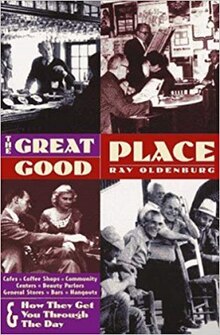
Espresso is one of the world's most popular coffee-brewing methods. Originating from Italy, the French also made significant contributions via the invention of coffee makers, predecessors of today's espresso machines.

The French Quarter, also known as the Vieux Carré, is the oldest neighborhood in the city of New Orleans. After New Orleans was founded in 1718 by Jean-Baptiste Le Moyne de Bienville, the city developed around the Vieux Carré, a central square. The district is more commonly called the French Quarter today, or simply "The Quarter", related to changes in the city with American immigration after the 1803 Louisiana Purchase. Most of the extant historic buildings were constructed either in the late 18th century, during the city's period of Spanish rule, or were built during the first half of the 19th century, after U.S. purchase and statehood.

An Internet café, also known as a cybercafé, is a café that provides the use of computers with high bandwidth Internet access on the payment of a fee. Usage is generally charged by the minute or part of hour. An Internet café will generally also offer refreshments or other services such as phone repair. Internet cafés are often hosted within a shop or other establishment. They are located worldwide, and many people use them when traveling to access webmail and instant messaging services to keep in touch with family and friends. Apart from travelers, in many developing countries Internet cafés are the primary form of Internet access for citizens as a shared-access model is more affordable than personal ownership of equipment and/or software. Internet cafés are a natural evolution of the traditional café. As Internet access rose many pubs, bars, and cafés added terminals and eventually Wi-Fi hotspots, eroding the distinction between the Internet café and normal cafés.
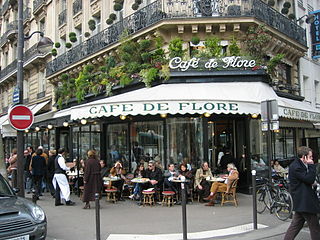
A coffeehouse, coffee shop, or café is an establishment that primarily serves various types of coffee, espresso, latte, and cappuccino. Some coffeehouses may serve cold drinks, such as iced coffee and iced tea, as well as other non-caffeinated beverages. A coffeehouse may also serve food, such as light snacks, sandwiches, muffins, fruit, or pastries. In continental Europe, some cafés also serve alcoholic beverages. Coffeehouses range from owner-operated small businesses to large multinational corporations. Some coffeehouse chains operate on a franchise business model, with numerous branches across various countries around the world.

Nightlife is a collective term for entertainment that is available and generally more popular from the late evening into the early hours of the morning. It includes pubs, bars, nightclubs, parties, live music, concerts, cabarets, theatre, cinemas, and shows. These venues often require a cover charge for admission. Nightlife entertainment is often more adult-oriented than daytime entertainment. People who prefer to be active during the night-time are called night owls.

Rosebank is a cosmopolitan commercial and residential suburb to the north of central Johannesburg, South Africa. It is located in Region B of the City of Johannesburg Metropolitan Municipality, and is the location of a Gautrain station.
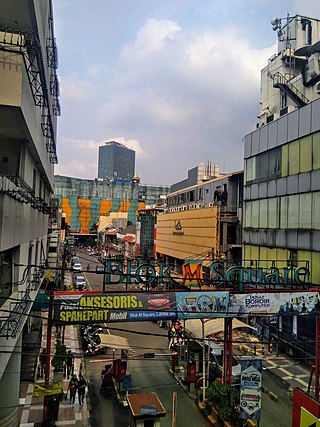
Blok M is a business and shopping quarter located in Kebayoran Baru, South Jakarta, Indonesia. It runs east from Iskandarsyah street to Bulungan street in the west. North from Falatehan street to Melawai street in the south. The development is similar to some developments near Kota, West Jakarta. On a daily basis, crowds of people throng its street, and even more so during nighttime. Much of the popularity of the quarter is due to the prices of goods, and the nightlife.

Cedar-Riverside, also referred to as the West Bank, or simply Riverside, is a neighborhood within Minneapolis, Minnesota. Its boundaries are the Mississippi River to the north and east, Interstate 94 to the south, and Hiawatha Avenue and Interstate 35W to the west. It has a longstanding tradition of cultural diversity and settlement, with a robust arts tradition.
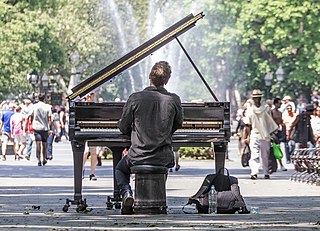
Placemaking is a multi-faceted approach to the planning, design and management of public spaces. Placemaking capitalizes on a local community's assets, inspiration, and potential, with the intention of creating public spaces that improve urban vitality and promote people's health, happiness, and well-being. It is political due to the nature of place identity. Placemaking is both a process and a philosophy that makes use of urban design principles. It can be either official and government led, or community driven grassroots tactical urbanism, such as extending sidewalks with chalk, paint, and planters, or open streets events such as Bogotá, Colombia's Ciclovía. Good placemaking makes use of underutilized space to enhance the urban experience at the pedestrian scale to build habits of locals.

Parisian cafés are a type of café found mainly in Paris, where they can serve as a meeting place, neighborhood hub, conversation matrix, rendez-vous spot, and a place to relax or to refuel for Parisian citizens.
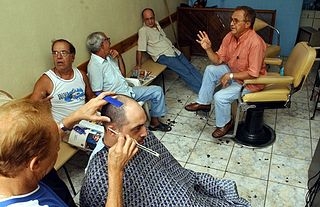
In sociology, the third place refers to the social surroundings that are separate from the two usual social environments of home and the workplace. Examples of third places include churches, cafes, bars, clubs, community centres, public libraries, gyms, bookstores, makerspaces, stoops, parks, theaters, and opera houses, among others. In his book The Great Good Place (1989), Ray Oldenburg argues that third places are important for civil society, democracy, civic engagement and establishing feelings of a sense of place.
Ray Oldenburg was an American urban sociologist who is known for writing about the importance of informal public gathering places for a functioning civil society, democracy, and civic engagement. He coined the term "third place" and is the author of The Great Good Place and the 2001 Celebrating The Third Place.

Coffee culture is the set of traditions and social behaviors that surround the consumption of coffee, particularly as a social lubricant. The term also refers to the cultural diffusion and adoption of coffee as a widely consumed stimulant. In the late 20th century, espresso became an increasingly dominant drink contributing to coffee culture, particularly in the Western world and other urbanized centers around the globe.
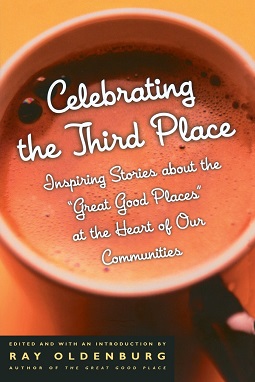
Celebrating The Third Place, subtitled: Inspiring Stories About The Great Good Places at the Heart of Our Communities, is a 2001 book by Ray Oldenburg. The book follows his 1989 book The Great Good Place which introduced the term "Third place" and is a collage of 19 essays which tell stories of active third places in the heart of communities.
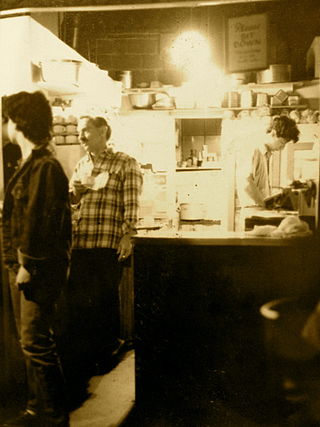
The Last Exit on Brooklyn was a Seattle University District coffeehouse established in 1967 by Irv Cisski. It is known for its part in the history of Seattle's counterculture, for its pioneering role in establishing Seattle's coffee culture, and as a former chess venue frequented by several master players.
Civility may denote orderly behavior and politeness. Historically, civility also meant training in the humanities.
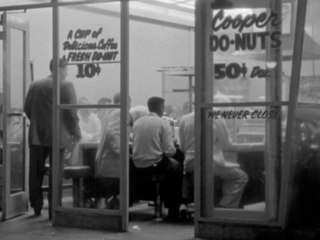
The Cooper Do-nuts Riot was an alleged uprising in reaction to police harassment of LGBT people at a 24-hour donut cafe in Los Angeles in the 1960s. Whether the riot actually happened, the date, location and whether or not the cafe was a branch of the Cooper chain are all disputed, and there is a lack of contemporary documentary evidence, with the Los Angeles Police Department (LAPD) stating that any records of such event would have been purged years ago.
Countries have cultivated coffee beans into various vehicles to satisfy needs unique to each country. Whether it be for energy, socialization, or tradition, the cultivation of coffee has served as a motivating force of the world. The modernization of coffee and its unique forms across cultures are markers of tradition and modern changes across continents. Coffee culture appears in the way in which people consume coffee, the way they make it, and where coffee is served and shared. Each of these factors combined reflects the lives of the people in these countries and the importance of coffee across the world.

Bipartisan Cafe is a coffee shop and bakery in the Montavilla neighborhood of Portland, Oregon, United States. Since Hobie Bender and Peter Emerson started the business in 2005, the venue has hosted events that include meetings of civic groups and politicians, and viewing parties for political events. Bipartisan Cafe has garnered a positive reception, and has been named as one of Portland's best coffee and pie eateries. The venue's marionberry pie was included in the American Automobile Association's 2022 list of the ten best regional Western dishes.

Spella Caffè is a coffee shop in Portland, Oregon, United States. Andrea Spella started the business as a cart in 2006, before opening a brick and mortar space in downtown Portland in 2010. The business has garnered a positive reception, and has been cited as an influence for other coffee company founders.
